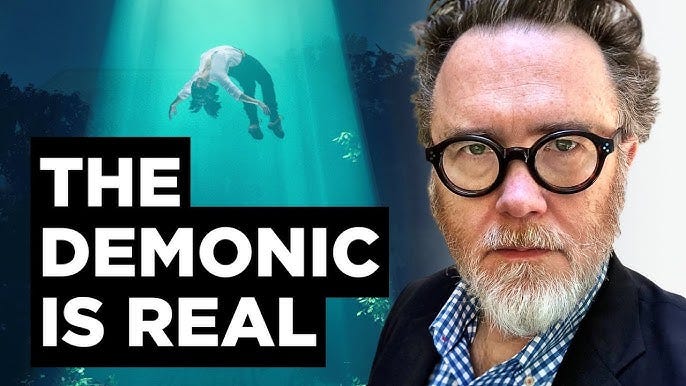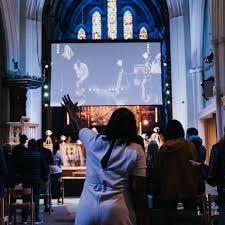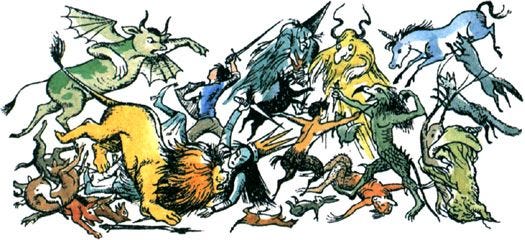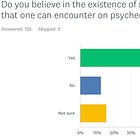Rod Dreher, the Enchanted Right, and the demonic
Notes from the ARC conference
There was an event in London this week that made me wish I was back in Blighty just so I could gawp at it. It was called the Alliance for Responsible Citizenship (ARC), a gathering of 4000 right-wing thinkers, politicians and industry figures at the ExCel Centre in London, many of them paying £1000 for a ticket.
The ARC’s mission: ‘to draw on our moral, cultural, economic, and spiritual foundations to develop a more hope-filled vision for the future and, ultimately, to re-lay the foundations of our civilisation.’
Whatever else it is, the ARC looks interesting and ambitious, and a lot more glam than your usual think-tank gathering – more like, I don’t know, a US political rally. This year the speaker rostrum included: Jordan Peterson, Peter Thiel, Nigel Farage, Kemi Badenoch, Bari Weiss, Douglas Murray, Konstantin Kisin, Niall Ferguson, David Brooks, Eric Weinstein and many others, sounding their trumpets to a similar marching song: ‘civilization is under threat, but we can save it by returning to its traditional foundations of Judeo-Christianity and unfettered capitalism’.
The ARC is run by a Tory policy wonk called Lady Philippa Stroud, who goes to a charismatic Christian church in London; and is funded by two British multimillionaires – Sir Paul Marshall, hedge fund manager, owner of GB News, Unherd and The Spectator and part of the same charismatic Christian church network; and Christopher Calder, hedge fund investor and founder of Legatum Institute.
Calder is a shadowy figure who never gives interviews. Sir Paul Marshall, meanwhile, is an increasingly public figure who seems to be on an unlikely mission to re-Christianize British society (where 5% of the population attend church).
Aaron Bastani, co-founder of left-wing media organisation Novara, noted:
The FT was similarly struck:
Part “megachurch”, part political rally, this week’s Arc conference put traditional family values and an exigent danger to western civilisation at the centre of what many who attended hoped would become a powerful new UK social movement. Importing the Christian values agenda that is a mainstay of US politics, the three-day Alliance for Responsible Citizenship (Arc) gathering saw conservative politicians, commentators, theologians and business leaders from around the world congregate to preach to an often-whooping crowd of more than 4,000.
Judging from the videos of the event, there were a lot of speeches about defending western Christian civilization from various threats – Woke, mass migration, the sexual revolution, trans and LGBT ideology, Islam, Net Zero. Sir Paul Marshall used the rostrum to attack the UK’s Net Zero carbon emissions pledge, and received warm applause from the audience of suits, many of them from big business.
I asked a few Christian friends in the UK what they thought of ARC. ‘Steering well clear’, said one. Another said: ‘I went along just to check it out, it was incredibly weird. There were a lot of my friends there [from UK Christian and right-wing circles], people I like, but I think some of them have lost the plot’. There’s a concern that some British Christians (affable, Anglican, moderate souls) are getting sucked into the whirlpool of the American online culture wars. Some of the British influencers on stage – Konstantin Kisin, Douglas Murray, Louise Perry - have reached huge online audiences by telling right-wing Americans what they want to hear. David Brooks of the NYT, meanwhile, had the temerity to criticize Trump’s government as ‘incompetent’ onstage – and got booed.
The Enchanted Right
One thing that struck me about the event, from afar, was its openness to the mystical and ecstatic, which is not surprising considering both ARC’s CEO (Philippa Stroud) and one of its main funders (Sir Paul Marshall) are ecstatic Christians, from the Holy Trinity Brompton / Alpha Course network, where I was briefly a happy-clappy Christian as well (I wrote about it in The Art of Losing Control). You also had ARC co-founder Jordan Peterson preaching his Jungian Traditionalism from the stage, Christian theologians like Rod Dreher, Jonathan Pageau and Os Guinness giving talks, mystic psychiatrist Iain McGilchrist in attendance, Eric Weinstein talking UFOs, and even psychedelic champions like Rav Arora and Professor Matthew Johnson. This was an expanded, enchanted Right.

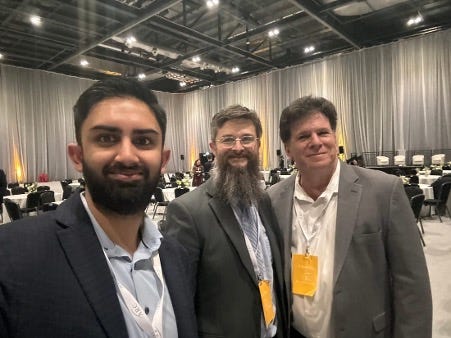

People are sometimes surprised when psychedelic politics skews right, but it seems to me there is more of an ‘enchanted right’ than an ‘enchanted left’ , and perhaps that’s been the case for a long time. I wrote about this four years ago, when I called it the Cosmic Right:
Many of the most popular thinkers in alternative spirituality — Plato, Nietzsche, Aldous Huxley, Yeats, Rene Guenon, Julius Evola, Joseph Campbell, Mircea Eliade, Carl Jung, Gurdjieff, Aleister Crowley, Chogyam Rinpoche, Jordan Peterson and many others — were on the right, some of them are on the far-right. How come?
First of all, right-wing spiritual thinkers believe in hierarchy and spiritual inequality. They believe in higher and lower levels of spiritual attainment…This can lead to various forms of hierarchical and authoritarian social systems, ruled by an elite few…Finally, one finds in much right-wing spirituality a suspicion of modern, secular, materialist, urban, multicultural, egalitarian, technocratic, mass democracy, and a hankering back to ‘ancient eternal wisdom’, traditional gender relations, and more closed, traditional, hierarchical societies united in one soulful volk and perhaps ruled by one great spiritual-political leader.
The right seems to have more openness at the moment to things like myth, mysticism, the ecstatic, intuition, esotericism, post-rationalism and post-liberalism, while the left seems to be more invested in defending the rationalist secular technocratic status quo. Indeed, there’s a 2018 book called Enchanted America (which I haven’t yet read) which suggests the principle divide in American politics is between rationalism and ‘intuitionalism / magic’, and ‘modern Conservatism has become an intuitionist movement’.
An interesting figure in this Enchanted Right is Rod Dreher, an American writer who lives in Hungary, and writes books and a prolific Substack. Dreher is part of a modern Orthodox mystical revival among Anglo-American men, alongside other figures like Paul Kingsnorth, Jonathan Pageau, Martin Shaw and theologian David Bentley Hart (Hart is the best of the bunch). I’ve been reading Dreher’s Substack, and his new book Living in Wonder: Finding Mystery and Meaning in a Secular Age, and I find his work interesting and worth grappling with.
To be clear, Dreher is a right-wing, MAGA-supporting, anti-immigrant, anti-abortion, culture-war-waging, Putin-apologising friend-of-JD-Vance. There’s a lot for me to dislike there, especially the apologism for Putin’s aggression, of the sort we heard from Donald Trump this week (this week has seen the end of the US-backed world order that’s held since WW2, and the birth of a new multipolar Great Power carving up of the world, but I’ll leave that to ex-MI6 boss Sir Alex Younger to explain).
Despite our differences, Dreher and I are both interested in ecstatic or mystical experiences, and the re-enchantment of western culture. We read a lot of the same authors – Jeffrey Kripal, Tanya Luhrmann, Iain McGilchrist, psychedelic research, UFO research – but we read it from quite different angles and arrive at quite different places. It’s interesting to me, reading Dreher’s Living in Wonder and his Substack articles, to come across familiar British figures like Martin Shaw, Paul Kingsnorth, Malcolm Guite and Iain McGilchrist – beardy mystics in pubs, modern Inklings, who are now being taken up and celebrated by the American Christian Right in ways they may well find disconcerting.
Dreher and the Demonic
Dreher, like me, is interested in the variety of ways people go beyond the self and the variety of weird experiences and encounters they have – via psychedelics, or contemplation, or UFO encounters, or extreme sports…and so on. That’s what I explored in The Art of Losing Control in 2017, and what he explores in Living with Wonder. As part of my book, I immersed myself in charismatic Christianity, via the same church network where Sir Paul Marshall and Lady Philippa Stroud worship – Holy Trinity Brompton (HTB) and its many offshoots.
I initially saw the Holy Trinity Brompton network as a British subculture still open to ecstatic states, with a community and set of practices that could help me connect to the Divine. And it did that, for a while. But I ultimately decided it was too simplistic in its theology and too confident in its cartography of ecstatic states and what they tell us about the universe, humanity, other cultures, the past and the future.
It’s true that charismatic Christian churches are places where people can open up to ecstatic states in ways that are often healing and inspiring. But (feel free to disagree with me here) they then explain those states with a narrow, conservative theology in which any non-Christian routes beyond the self or non-Christian explanations of mystical experience are wrong at best and demonic at worse. I’d hear some HTB friends (one of them is now an MP) talking about ‘the Enemy’, as if Satan was behind the rise of multiculturalism and the decline of church attendance. Spend too long in that setting and you start to see non-Christian religions or even little New Age shops as Luciferian.
I think this is equally true of Dreher’s Orthodox Christianity. Orthodox Christianity may have more sophistication than evangelical Christianity when it comes to contemplation and mystical practices. But it nonetheless ends up in the same simplistic ontological binary of God versus the Devil.
Dreher thinks that when you have an ecstatic experience and encounter something greater than you, you either encounter God and his angels or you encounter the Devil and his demons. You walk through the wardrobe of your psyche and you either encounter Aslan or you encounter the White Witch bearing Turkish Delight. It’s one or the other, black or white.
For that reason, Dreher encourages his readers to explore altered states while also telling them: you have to be really careful in these deep waters, because your soul is at risk.
He’s both fascinated by and deeply suspicious of psychedelics because they could bring you to Jesus (he mentions with a touch of embarrassment that he himself converted to Christianity after an LSD trip in his youth). But they could also open you up to the demonic. So there are better, safer ways to open yourself up, he suggests. I agree to some extent - and have met a handful of people who are sure they have been possessed by malign spirits while on psychedelics. They’ve even described their limbs twisting back in weird ways. But the idea that everything one encounters on psychedelics is evil / demonic is simplistic and ignores all the healing people find from these substances - Dreher himself found God on LSD.
You can imagine what Dreher thinks of New Age culture. He thinks precisely what I thought of it when I was briefly a born-again Christian – it’s an indiscriminate spiritual orgy (I sneered) where people are very likely to come away with an a Spiritually-Transmitted Disease. Again, this caution in spiritual waters is not entirely misplaced. I think it’s very likely that we do live in a universe filled with higher non-human intelligences. If so, it’s highly likely that some of them are well-disposed towards us and some ill-disposed, some symbiotic, others parasitic. So Dreher and other Christians are right to take care in these spaces and not follow the first genie who promises to grant your wishes.
But to go from there to the simplistic Manichean cartography of ‘everything out there is either Jesus or The Enemy’ seems to be a massive and unsupported leap, and a kind of cosmic provincialism.
Room 337
Let me suggest a metaphor. The human condition, with regard to ecstatic experiences, is like a man tripping alone in a hotel room, Room 337. The man hears all kind of noises coming from outside the room, from the rooms next door, the corridor, the street outside, and the whirring of the air conditioning and the fridge in his room. These noises, these muffled thumps from beyond, are what happens when we have an ecstatic experience and receive information or even visitations from beyond the self.
The man, tripping away on the floor of Room 337, desperately tries to figure out what all these weird noises mean. His mind, being a story-constructing machine, weaves the diverse data of the noises into a coherent paranoid narrative. It’s all a big cosmic drama between Good and Evil forces and it’s all focused on him.
After the paywall, decoding the muffled thumps.


